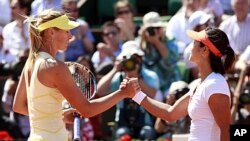China is celebrating tennis player Li Na's victory at the French Open semifinal in Paris.
Li defeated Russian Maria Sharapova Thursday to win a place in the women's final, where she will compete Saturday against Italian defending champion Francesca Schiavone.
If Li wins, she would become the first Asian to achieve a singles Grand Slam victory.
To find out what Li Na is doing for Chinese tennis, VOA’s Sarah Williams spoke with Tom Cannon, professor of Strategic Development at the University of Liverpool Management School, and an authority on sports financing in Asia.
What has Li Na’s success meant to Chinese tennis?
“So far, it’s built on obviously what happened in Athens [at the 2004 Summer Olympics] when China’s women’s doubles team won the gold medal and that created tremendous momentum. It’s moved it to a plane where it is increasingly seen as the dominant sport for women who wish to participate in sports in China generally. It’s massively increased the amount of government support for it because they’re seeing it as a great way for gaining profile for China. And it’s legitimizing the sport more widely and, in some ways most importantly, it’s highlighting in a sense the achievements of the ATP. Because the reality is the ATP has put a tremendous amount of effort into tennis in China. Along with the women’s game, they’re basically driving the game forward in China and see China as a major opportunity and the new growth market for tennis around the world.”
Li Na at the French Open semifinal match in Paris, June 2.
How do you think the Chinese look at the sport of tennis?
“Of course, it has been seen as a Western sport. In a sense, the vast majority of sports have been seen as Western sports. When, for example, in basketball [Houston Rockets player Yao Ming] had the phenomenal success in the U.S.A. at the NBA [National Basketball Association], that boosted it. We’ve seen it in athletics, when the hurdler [Liu Xiang] achieved that success [winning a gold medal in the 2004 Olympics], it’s seen as something very important in China as to how people can compete globally. [Li Na] is doing it as a woman athlete in a sport which has already got momentum in China, and it’s just basically accelerating that momentum. If you include construction and all the relating costs that are taking place in the tennis industry in China, I reckon it will move it from a $3.5 billion or $4 billion economy to a $5 billion economy over the next year or two, and her success will an important part of that.”
Li Na has been around in professional tennis for a number of years now. Why do you think she’s really quite successful now?
“First of all, women’s tennis is in a bit of a difficult situation for the moment, where some of the biggest names are not delivering. In a sense, there’s a gap at the top of women’s tennis, isn’t there? Whether it’s Maria Sharapova or whoever it happens to be, there isn’t the dominance that we’re seeing in men’s tennis of a relatively small number of dominant players who basically are controlling the game. You’ve got this gap at the top, and she’s moving to a considerable degree, not only to compete at the top of the game where the opportunity lies, but also the truth is, she’s gotten stronger.”
It seems that Li Na performs especially well on big stages like the Grand Slams. For examnple, after the Australian Open, she didn’t perform as well, but is now doing very well.
“We understand that coaches are guiding her on that. What the coaches seem to be doing is focusing her efforts more and more on the 'big ticket' items. I understand that’s to some degree being encouraged by the Chinese government or Chinese tennis authorities, who do see these big tournaments as not only a good way for her to get her own profile to demonstrate and force her way into the top rankings, but also that’s where national prestige is built. The truth is it is on the main circuits. It is the Wimbledons; it is the Roland Garros; it is the Australian Open; it is the U.S. Open. That’s where the national profile is achieved, and that’s where you get, certainly for tennis in China, you get a virtual circle. She does well because she concentrates her efforts instead of dissipating her efforts.”




